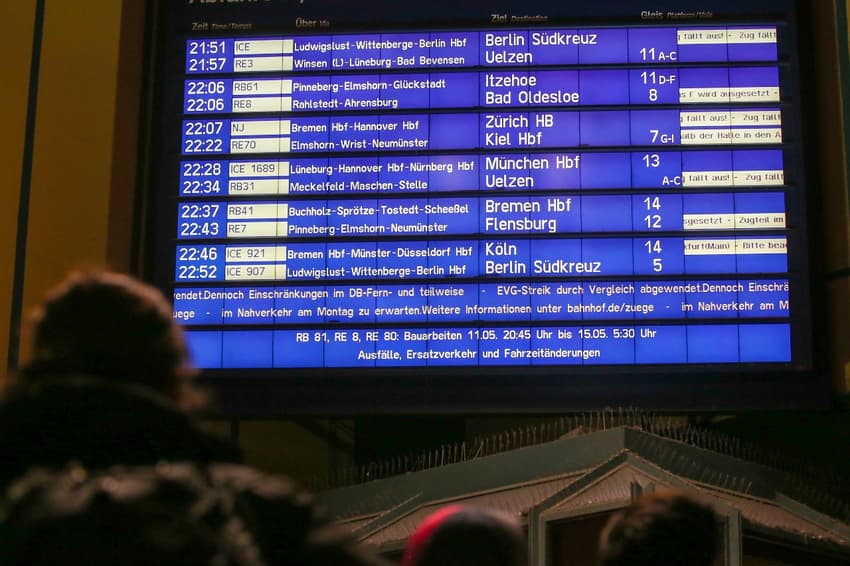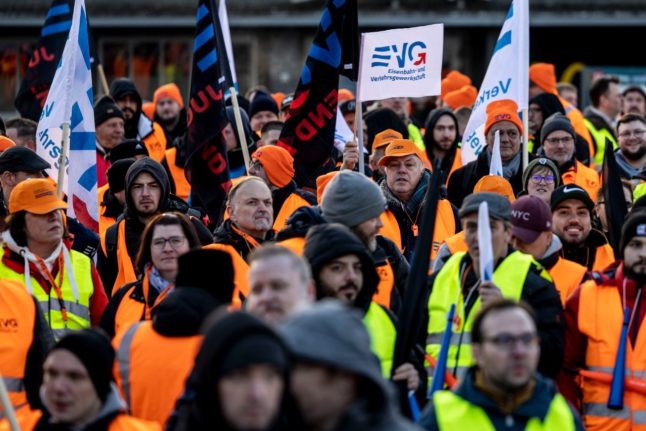German rail workers reject Deutsche Bahn pay deal: Are more strikes looming?

Germany's largest rail union has dismissed Deutsche Bahn's latest pay offer as "insufficient", raising the prospect of further strikes.
In a statement released late on Tuesday night, rail union EVG said its negotiators had rejected the improved pay deal "unanimously" and called on Deutsche Bahn to resume talks on Wednesday.
"Key aspects of our demands continue to be unmet," said EVG chief negotiator Kristian Loroch. "What is currently on the table is socially unjust."
The union has demanded that the state-owned rail operator present an entirely new offer and sit down for further negotiations this week.
"That should be in the interest of the company, because as long as we're sitting at the negotiating table, there won't be any strikes," warned Loroch.
But Deutsche Bahn dismissed the notion of further talks as unproductive.
"It's pointless at the moment because the EVG is not moving an inch," DB personnel board member Martin Seiler said. The union is "simply stubbornly insisting on its initial demands" and not proposing any solutions, he added.
The latest pay offer from Deutsche Bahn is the third offer the rail operator has made to EVG, following three rounds of failed talks between the two parties.
READ ALSO: Strikes: Deutsche Bahn to resume talks with Germany's largest rail union
Most recently, the rail company had pitched a 12 percent pay rise alongside €2,850 in inflation compensation - half of which would be paid out in July. This offer would be valid for two years.
EVG, meanwhile, has been pushing for a 12 percent pay rise, but have set that at a minimum of €650 extra per month, which would represent a steep increase for the lowest earners.
They are also demanding that the new collective agreement expires within a year, opening the opportunity to negotiate another pay increase in 2024.
Deutsche Bahn said it had made "expensive concessions" regarding the timing and terms of the pay increase and claimed the union's demands were putting a burden on taxpayers.
But EVG claimed it had been flexible with its demands and had presented options for moving the talks forward.
"Last week, we discussed with Deutsche Bahn what changes are conceivable to resolve the existing injustices and how the minimum amount we demanded could be reflected," said Loroch.
"Unfortunately, none of this is reflected in the offer presented to us last week."
More warning strikes?
The deadlock between the two parties has heightened the chances of further rail strikes that could paralyse national train services.
So far in the course of the negotiations, the union has threatened two rounds of national warning strikes.
Back in April, EVG called a day-long strike on the national rail network, while a further 50-hour strike in May was called off at the last minute.

Demonstrators from the EVG rail union gather in front of Duisburg Hauptbahnhof during a strike in March. Photo: picture alliance/dpa | Christoph Reichwein
READ ALSO: German rain union threatens week-long strike after failed talks
However, the union has repeatedly warned that the next round of strikes could be far more disruptive than the previous one.
“The next strikes will last longer,” EVG negotiator Cosima Ingenschay told the Süddeutsche Zeitung in an interview in April, adding that the union could “paralyse the train network for weeks”.
Though no strike announcement has been made yet, there is speculation that a decision on further walk-outs could come after June 5th, when rival rail union GDL presents its own proposals for wage increases ahead of negotiations in autumn.
GDL, which represents around 40,000 workers compared to EVG's 230,000, has previously criticised the larger union for being too moderate in its demands.
This came to a head during the pandemic, when EVG accepted smaller wage increases since the rail company was making heavy losses.
This time around, however, the union appears far more determined to flex its muscles and take a much tougher line in talks.
Until the two parties reach an agreement, passengers on German trains still face the prospect of further warning strikes, disruptions and delays.
Comments
See Also
In a statement released late on Tuesday night, rail union EVG said its negotiators had rejected the improved pay deal "unanimously" and called on Deutsche Bahn to resume talks on Wednesday.
"Key aspects of our demands continue to be unmet," said EVG chief negotiator Kristian Loroch. "What is currently on the table is socially unjust."
The union has demanded that the state-owned rail operator present an entirely new offer and sit down for further negotiations this week.
"That should be in the interest of the company, because as long as we're sitting at the negotiating table, there won't be any strikes," warned Loroch.
But Deutsche Bahn dismissed the notion of further talks as unproductive.
"It's pointless at the moment because the EVG is not moving an inch," DB personnel board member Martin Seiler said. The union is "simply stubbornly insisting on its initial demands" and not proposing any solutions, he added.
The latest pay offer from Deutsche Bahn is the third offer the rail operator has made to EVG, following three rounds of failed talks between the two parties.
READ ALSO: Strikes: Deutsche Bahn to resume talks with Germany's largest rail union
Most recently, the rail company had pitched a 12 percent pay rise alongside €2,850 in inflation compensation - half of which would be paid out in July. This offer would be valid for two years.
EVG, meanwhile, has been pushing for a 12 percent pay rise, but have set that at a minimum of €650 extra per month, which would represent a steep increase for the lowest earners.
They are also demanding that the new collective agreement expires within a year, opening the opportunity to negotiate another pay increase in 2024.
Deutsche Bahn said it had made "expensive concessions" regarding the timing and terms of the pay increase and claimed the union's demands were putting a burden on taxpayers.
But EVG claimed it had been flexible with its demands and had presented options for moving the talks forward.
"Last week, we discussed with Deutsche Bahn what changes are conceivable to resolve the existing injustices and how the minimum amount we demanded could be reflected," said Loroch.
"Unfortunately, none of this is reflected in the offer presented to us last week."
More warning strikes?
The deadlock between the two parties has heightened the chances of further rail strikes that could paralyse national train services.
So far in the course of the negotiations, the union has threatened two rounds of national warning strikes.
Back in April, EVG called a day-long strike on the national rail network, while a further 50-hour strike in May was called off at the last minute.

READ ALSO: German rain union threatens week-long strike after failed talks
However, the union has repeatedly warned that the next round of strikes could be far more disruptive than the previous one.
“The next strikes will last longer,” EVG negotiator Cosima Ingenschay told the Süddeutsche Zeitung in an interview in April, adding that the union could “paralyse the train network for weeks”.
Though no strike announcement has been made yet, there is speculation that a decision on further walk-outs could come after June 5th, when rival rail union GDL presents its own proposals for wage increases ahead of negotiations in autumn.
GDL, which represents around 40,000 workers compared to EVG's 230,000, has previously criticised the larger union for being too moderate in its demands.
This came to a head during the pandemic, when EVG accepted smaller wage increases since the rail company was making heavy losses.
This time around, however, the union appears far more determined to flex its muscles and take a much tougher line in talks.
Until the two parties reach an agreement, passengers on German trains still face the prospect of further warning strikes, disruptions and delays.
Join the conversation in our comments section below. Share your own views and experience and if you have a question or suggestion for our journalists then email us at [email protected].
Please keep comments civil, constructive and on topic – and make sure to read our terms of use before getting involved.
Please log in here to leave a comment.